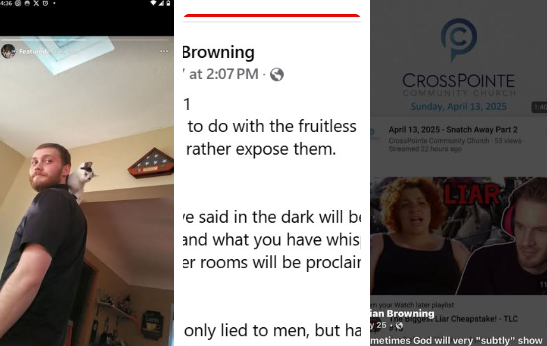In a chilling act of violence narrowly thwarted by heroic intervention, Brian Browning, a 31-year-old white male, was identified as the suspect in an attempted mass shooting outside CrossPointe Community Church in Wayne, Michigan on the morning of Sunday, June 22, 2025. The incident, which unfolded during a well-attended service with more than 150 congregants present, including numerous children, could have resulted in catastrophic loss of life had it not been for the decisive actions of members within the church community.
The sequence of events began as Browning arrived at the church premises and began firing outside the building. What could have turned into a mass casualty event was instead brought to an abrupt and final halt through a coordinated, impromptu defense. According to the church’s pastor, Browning was first intercepted by a deacon, who rammed him with a truck—a spontaneous yet deliberate act aimed at slowing or incapacitating the attacker. This critical maneuver bought the church’s armed security guard enough time to confront Browning and shoot him before he could gain access to the building. The only reported injury was to the security guard himself, who sustained a minor gunshot wound but is expected to recover fully.
This event occurred amid a broader and troubling national trend: the targeting of houses of worship in acts of domestic violence or ideological extremism. The fact that Browning was able to reach the church with a firearm during an active service underscores both the vulnerability of religious institutions and the critical importance of proactive internal security measures.
Cryptic Warnings and Missed Red Flags
Perhaps most unnerving is the revelation that Browning had signaled his intentions, albeit subtly, weeks in advance. On May 25, nearly a month prior to the shooting, he posted a cryptic message to his Facebook page: “Sometimes God will ‘subtly’ show you the signs”—a phrase accompanied by an image of CrossPointe Community Church’s public page. Though vague, this message now seems, in hindsight, like a grim foreshadowing. Social media posts of this kind are often ambiguous enough to avoid triggering alarms, yet specific enough that they carry chilling retrospective meaning after violence has occurred.
This kind of digital breadcrumb trail is sadly familiar in the age of lone-wolf attacks and ideologically driven shooters. Whether Browning’s message reflected a personal vendetta, mental health crisis, or ideological motive remains under investigation. Authorities have not publicly stated a definitive motive, though his online behavior suggests the church may have been a pre-selected target.
Church Security: Preparedness Tested
The pastor’s account of the events highlights the preparation and bravery of CrossPointe’s congregation. The security guard’s ability to respond with force, and the deacon’s quick thinking with his vehicle, were decisive factors. This reflects a larger movement within American religious institutions to arm and train internal security teams in response to increased threats. CrossPointe appears to have taken such precautions seriously—and with life-saving consequences.
That the only injury sustained was to the security guard, despite the attack occurring during a service, is extraordinary. The pastor emphasized the role of teamwork, readiness, and courage in preventing what could have been an unprecedented tragedy for the Wayne community. Indeed, by the time Browning was neutralized, he had not made it inside the building, and no congregants had been harmed.
The Public Reckoning: Motives, Memory, and Mourning
As the public digests the rapid series of developments—Browning’s identity, his apparent premeditation, the church’s effective response—many are left grappling with deeper societal questions. How did a man reach the point of planning an armed assault on a local house of worship? What indicators were missed in the lead-up? Should Browning’s online activity have been flagged? And most significantly, what steps can churches, law enforcement, and communities take to prevent future threats?
The Wayne Police Department and state investigators are expected to release further details in the coming days as they examine Browning’s communications, movements, and possible affiliations. The lack of any known connection between Browning and CrossPointe raises further questions about motive. Was he acting on a delusion, a grudge, or under the influence of a broader ideological framework? Was the church symbolic in some way to him, or merely a convenient target?
These questions matter not only for justice but for healing. For now, the Wayne community and CrossPointe Church are taking measured steps forward. The pastor has praised the unity of his congregants and the resilience of the children present during the traumatic episode. While grief for what might have happened hangs in the air, there is also a prevailing sense of gratitude—for life spared, for courage shown, and for the fact that the congregation, though shaken, remains whole.

